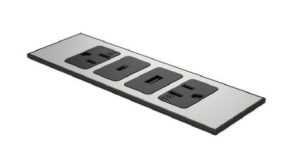Fort Wayne, Indiana – Group Dekko, Inc. and its subsidiary, Furnlite, Inc., have initiated legal proceedings against Metro Light & Power, LLC. The crux of the dispute lies in allegations of trade dress infringement under the Lanham Act, with Dekko and Furnlite seeking a declaratory judgment to invalidate Metro’s claims.
Metro Light & Power, LLC, based in Teaneck, New Jersey, has accused Dekko and Furnlite of infringing upon its trade dress rights. Specifically, Metro contends that Dekko’s Furnlite products bear a striking resemblance to Metro’s Bezel products, leading to consumer confusion. Metro has threatened legal action unless Dekko and Furnlite cease production and sales of their allegedly infringing products. In response to Metro’s allegations, Dekko and Furnlite have taken a firm stance, denying any wrongdoing. They assert that their products do not infringe upon Metro’s trade dress rights. Moreover, they argue that trade dress protection does not extend to functional features of a product, and they maintain that their own design patents predate Metro’s establishment.
In response to Metro’s allegations, Dekko and Furnlite have taken a firm stance, denying any wrongdoing. They assert that their products do not infringe upon Metro’s trade dress rights. Moreover, they argue that trade dress protection does not extend to functional features of a product, and they maintain that their own design patents predate Metro’s establishment.
Central to the dispute is the validity of Metro’s trade dress. Trade dress protection applies to the overall appearance of a product, but only if it serves as a source identifier and is non-functional. Dekko and Furnlite contend that Metro’s trade dress lacks distinctiveness and does not function as a source identifier. They argue that the design features highlighted by Metro serve functional purposes rather than acting as distinctive identifiers.
Furthermore, Dekko and Furnlite challenge Metro’s assertion of secondary meaning in the marketplace, emphasizing that consumers do not associate the alleged trade dress with Metro as a sole source of origin. They maintain that Metro’s trade dress claims are unfounded and seek a declaratory judgment affirming the invalidity of Metro’s alleged trade dress.
The legal battle between Dekko, Furnlite, and Metro underscores the complexities surrounding trade dress infringement claims. As the case unfolds, it will be crucial for the court to carefully analyze the design elements in question and determine the validity of Metro’s trade dress claims. Ultimately, the outcome of this case will have significant implications for the parties involved and provide valuable insights into the interpretation and application of trade dress laws in the realm of product design.
The case has been assigned to Judge Damon R. Leichty and Magistrate Judge Susan L. Collins, in the U.S. District Court of Northern Indiana, and assigned Case No. 1:23-cv-00465-DRL-SLC.
 Indiana Intellectual Property Law News
Indiana Intellectual Property Law News

